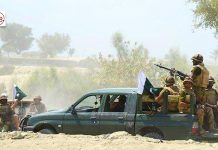On November 9, a massive explosion struck Quetta Railway Station, killing more than 30 people and injuring dozens. The Baloch Liberation Army (BLA) claimed responsibility for the attack, identifying the bomber as a member of its Majeed Brigade.
The Quetta suicide attack marks the deadliest single attack on military officers in Balochistan and ranks as the second deadliest suicide attack in Pakistan Army history in terms of military fatalities. Security experts say the attack highlights the BLA’s evolving tactics and growing operational capabilities.

Casualties and Target
At approximately 8:20 a.m., a suicide bomber targeted a group of Pakistan Army non-commissioned officers gathered on the railway platform in Quetta. The soldiers were preparing to board the Jaffer Express after completing their training at the School of Infantry and Tactics.

The explosion, which analysts suggest was executed with a high level of planning, left 31 people dead, including 19 confirmed army personnel, and injured more than 55 others, several of whom remain in critical condition. Pakistani authorities have expressed concern that the death toll may rise due to the severe injuries of several victims.
Claim of Responsibility and Profile of the Attacker
The Baloch Liberation Army, a “pro-independence” armed group in Balochistan, claimed responsibility for the attack. In a statement, the group said the operation was carried out by its Majeed Brigade, known for “fidayee or self-sacrificial” missions. The BLA attributed the success of the attack to its intelligence wing, the Zephyr Intelligence Research and Analysis Bureau (ZIRAB), which reportedly tracked the movements of the targeted personnel.

The BLA’s media wing, Hakkal, released an image of the attacker, identified as Muhammad Rafiq Bizenjo, also known by the alias “Washen.” According to the group, Bizenjo had been involved in the Baloch independence movement for over a decade. He began his activism with the Baloch Students Organization in 2013 before joining the BLA in 2017. The group said that he volunteered for a suicide mission in 2023 and underwent more than a year of specialized training with the Majeed Brigade.
Security Response
In response to the Quetta blast, Pakistani authorities swiftly imposed a nationwide red alert at major railway stations. Additional railway police personnel and bomb disposal squads have been deployed at key locations, with intensified security screening measures for passengers. Inspector General of Railway Police in Karachi, Rao Sardar Ali Khan, said that walk-through gates and screening procedures had been installed at major stations to prevent further attacks.

The heightened security measures reflect growing concerns over the BLA’s operational capabilities. The Quetta attack marks the sixth major operation claimed by the group in 2024. Last month, the BLA targeted a Chinese delegation in Karachi, resulting in multiple fatalities. Security analysts suggest that these attacks indicate a shift in the BLA’s strategy, with an increasing focus on high-profile targets, including Pakistani military personnel, strategic security infrastructure, and foreign investments—particularly those tied to China’s economic presence in the region.
Security experts say the coordination between the Majeed Brigade and the BLA’s intelligence wing, ZIRAB, signals a level of planning that may pose an increasing challenge for Pakistani security forces.
In its statement, the BLA warned that if Pakistan’s military presence in Balochistan continues, future attacks will escalate and could extend to major cities in Pakistan. The group called for the immediate withdrawal of Pakistani forces and urged international recognition of Balochistan’s sovereignty. The BLA also appealed to the international community to support what it describes as a “legal and defensive struggle” for independence, insisting it would “not back down” from its objectives.






























